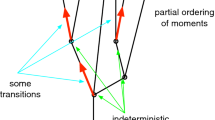Abstract
One of the basic assumptions of David Lewis's formal semantics of counterfactuals is that the crucial relation of comparative similarity between possible worlds is a linear ordering.Yet there are arguments that when we take into account relativistic features of space-time, this relationshould be only a partial ordering. The first part of the paper deals with the question of how to formulate appropriatetruth conditions for counterfactuals under the supposition of a partial ordering of possible worlds. Such truthconditions will be put forward, and it will be argued that they are more general than those proposed in recentliterature, because they turn out to be applicable also when the so-called Limit Assumption is not met. The secondpart analyzes two relativistically invariant ways of interpreting spatiotemporal counterfactuals with antecedentsreferring to free-chance point events. After briefly examining key differences between these two approaches,the issue of their extension for a broader class of antecedents will be addressed. Following the approach of Finkelstein (1999), who has proposed a specifically designed similarity relation between possible worlds, servingas a generalization tool in the case of one of the above intuitions, the possibility of a similar extension forthe second interpretation will be considered. The main result of the paper is the theorem to the effect that thegeneralization of the second intuition is impossible to obtain. More specifically, the theorem proved in the paperstates that there is no similarity relation which together with the Lewis-style truth conditions for counterfactualswould imply the second of the above interpretations as a special case. Some consequences of thistheorem for the applicability of the Lewis logic of counterfactuals to quantum phenomena will be briefly mentionedat the end of the paper.
Similar content being viewed by others
REFERENCES
Bedford, D. and H. P. Stapp: 1995, 'Bell's Theorem in an Indeterministic Universe', Synthese 102, 139–164.
Dickson, M.: 2002, 'Bohr on Bell: A Proposed Reading of Bohr and Its Implications for Bells Theorem', in T. Placek and J. Butterfield (eds.), Non-Locality and Modality, Dordrecht, pp. 19–35.
Finkelstein, J.: 1999, 'Space-Time Counterfactuals', Synthese 119, 287–298.
Finkelstein, J.: 1998, 'Yet Another Comment on Nonlocal Character of Quantum Theory', preprint quant-ph/9801011
Ghirardi, G. and R. Grassi: 1994, 'Outcome Predictions and Property Attribution: The EPR Argument Reconsidered', Studies in the History and Philosophy of Science 25(3), 397–423.
Griffiths, R. B.: 1999, 'Consistent Quantum Counterfactuals', Phys. Rev. A 60(1).
Lewis, D.: 1973, Counterfactuals, Cambridge, MA.
Lewis, D.: 1981, 'Ordering Semantics and Premise Semantics for Counterfactuals', J. Philosophical Logic 10, 217–234.
Lewis, D.: 1986, 'Counterfactual Dependence and Time's Arrow' in Philosophical Papers, Vol. II, Oxford University Press, Oxford.
Mermin, D.: 1998, 'Nonlocal Character of Quantum Theory?', Amer. J. Phys. 66(10), 920–924.
Pollock, John L.: 1976, 'The “Possible Worlds” Analysis of Counterfactuals', Philosophical Studies 29, 469–476.
Redhead, M.: 1987, Non-Locality, Incompleteness and Realism, Cambridge.
Redhead, M., J. Butterfield, and R. Clifton: 1990, 'Nonlocal Influences and Possible Worlds', Brit. J. Phil. Sci. 41, 5–58.
Redhead, M. and P. La Riviere: 1997, 'The Relativistic EPR Argument', in R. S. Cohen, M. Horne, and J. Stachel (eds.), Potentiality, Entanglement and Passion-at-a-Distance, Dordrecht.
Stapp, H.: 1997, 'Nonlocal Character of Quantum Theory', Amer. J. Phys. 65, 300–304.
Stapp, H.: 1999, 'Comments on “Non-locality, Counterfactuals, and Quantum Mechanics”', Phys. Rev. A 60(3), 2595–2598.
Unruh, W.: 1999, 'Nonlocality, Counterfactuals, and Quantum Mechanics', Phys. Rev. A 59, 126–130.
Unruh, W.: 2002, 'Is Quantum Mechanics Non-Local?', in T. Placek and J. Butterfield (eds.), Non-Locality and Modality, Dordrecht, pp. 125–136.
Author information
Authors and Affiliations
Rights and permissions
About this article
Cite this article
Bigaj, T. Counterfactuals and Spatiotemporal Events. Synthese 142, 1–19 (2004). https://doi.org/10.1023/B:SYNT.0000047707.96275.08
Published:
Issue Date:
DOI: https://doi.org/10.1023/B:SYNT.0000047707.96275.08




